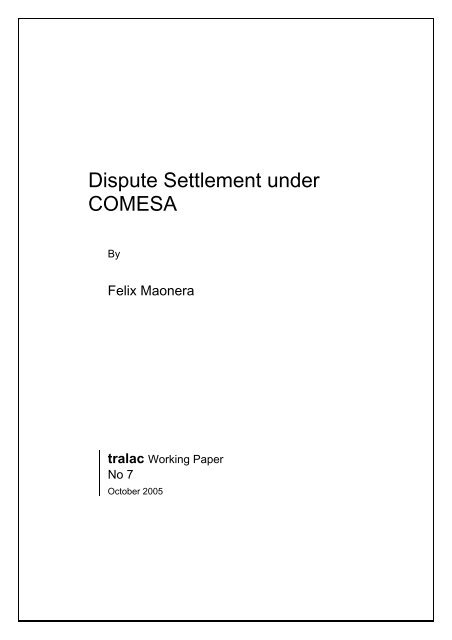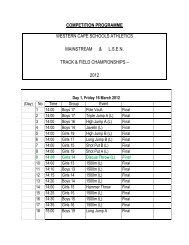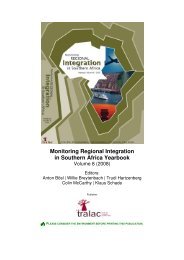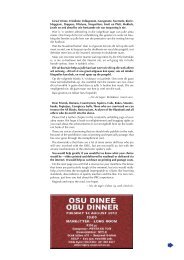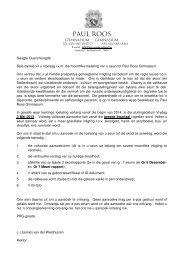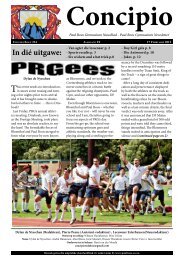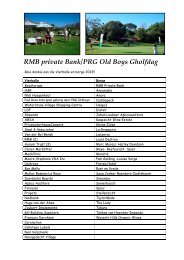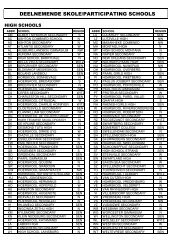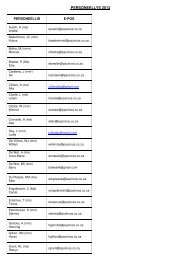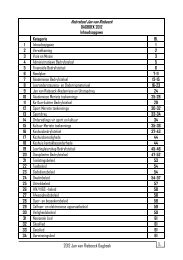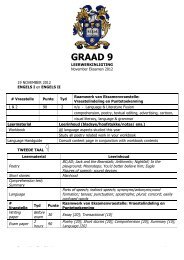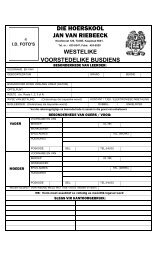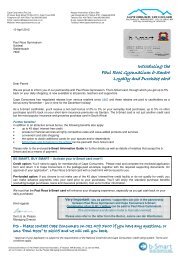Dispute Settlement under COMESA - Paul Roos Gymnasium
Dispute Settlement under COMESA - Paul Roos Gymnasium
Dispute Settlement under COMESA - Paul Roos Gymnasium
Create successful ePaper yourself
Turn your PDF publications into a flip-book with our unique Google optimized e-Paper software.
<strong>Dispute</strong> <strong>Settlement</strong> <strong>under</strong><br />
<strong>COMESA</strong><br />
By<br />
Felix Maonera<br />
tralac Working Paper<br />
No 7<br />
October 2005
Abstract<br />
The <strong>COMESA</strong> Court of Justice, established in 1994 <strong>under</strong><br />
Article 7 of the <strong>COMESA</strong> Treaty, became operational in 1998.<br />
The Judges of the Court were appointed at the Third <strong>COMESA</strong><br />
Summit on 30 June 1998 at Kinshasa in the Democratic<br />
Republic of Congo. The Court was to be temporarily hosted<br />
within the <strong>COMESA</strong> Secretariat from 1998, and in March 2003,<br />
<strong>COMESA</strong> decided that the seat of the Court be moved to<br />
Khartoum, in the Republic of Sudan. However, the Court has to<br />
date remained in Lusaka, Zambia. Although the Court is an<br />
integral part of the <strong>COMESA</strong> integration process, little appears<br />
to be known about it. This paper seeks to give a brief overview<br />
of the Court, its jurisdiction, and how it works, against the<br />
background of some cases that it has adjudicated upon.
Table of Contents<br />
Abbreviations.............................................................................................................. 0<br />
1 Introduction.......................................................................................................... 1<br />
2 The judges, jurisdiction and the competent parties ............................................. 3<br />
3 Agents, lawyers, experts and costs ................................................................... 10<br />
4 Some decided cases ......................................................................................... 13<br />
5 Some concluding thoughts ................................................................................ 19<br />
References ............................................................................................................... 21<br />
List of cases filed, disposed of and pending 22<br />
www.tralac.org
Abbreviations<br />
Authority<br />
<strong>COMESA</strong><br />
PTA<br />
The Council<br />
The Court<br />
The President<br />
The Treaty<br />
The supreme policy organ of <strong>COMESA</strong>, made up of the Heads of<br />
State and Government<br />
Common Market for East and Southern Africa<br />
Preferential Trade Area<br />
<strong>COMESA</strong> Council of Ministers<br />
<strong>COMESA</strong> Court of Justice<br />
The Judge who is President of the Court<br />
Treaty Establishing the Common Market of East and Southern<br />
Africa, 1994<br />
0
tralac Working Paper no. 7<br />
www.tralac.org<br />
1 Introduction<br />
The Common Market for East and Southern Africa (<strong>COMESA</strong>), a grouping of<br />
nineteen countries, 1 in 1994 replaced the former Preferential Trade Area (PTA) which<br />
had existed from 1981. <strong>COMESA</strong> was established as an organization of free,<br />
independent, sovereign states which agreed to cooperate in developing their natural<br />
and human resources for the good of all their people. Its main focus is on the<br />
formation of a large economic and trading unit that is capable of overcoming some of<br />
the barriers that are faced by individual states.<br />
<strong>COMESA</strong> has a decision making structure at the head of which is the Authority, the<br />
supreme policy organ of <strong>COMESA</strong>, made up of the Heads of State and Government<br />
of all the member countries; a Council of Ministers responsible for policy making;<br />
technical committees and a number of other advisory bodies. Several institutions,<br />
which include a Court of Justice (the Court), have been created to promote subregional<br />
cooperation and development. Overall co-ordination of the activities of<br />
<strong>COMESA</strong> is the responsibility of the Secretariat, based in Lusaka, Zambia.<br />
The Court was established in 1994 <strong>under</strong> Article 7 of the <strong>COMESA</strong> Treaty, and<br />
became operational in 1998. The Judges of the Court were appointed by the<br />
Authority during the Third <strong>COMESA</strong> Summit on 30 June 1998 at Kinshasa in the<br />
Democratic Republic of Congo. The Registrar of the Court was then appointed by the<br />
<strong>COMESA</strong> Council of Ministers (the Council), during its meeting in June 1998, also at<br />
Kinshasa. The Court was to be temporarily hosted within the <strong>COMESA</strong> Secretariat<br />
from 1998. In March 2003, the Authority decided that the seat of the Court should be<br />
in Khartoum, in the Republic of Sudan, but due to some technical difficulties, the<br />
Court has to date remained in Lusaka, Zambia. To ensure the independence of the<br />
Court, Article 9 (2) (c) of the <strong>COMESA</strong> Treaty provides that the Council shall give<br />
directions to all subordinate organs of <strong>COMESA</strong> other than the Court.<br />
1 As shown on the <strong>COMESA</strong> website, http://www.comesa.int/countries/, last visited on 27/07/2005, the<br />
countries are Angola, Burundi, Comoros, D.R. Congo, Djibouti, Egypt, Eritrea, Ethiopia, Kenya,<br />
Madagascar, Malawi, Mauritius, Rwanda, Seychelles, Sudan, Swaziland, Uganda, Zambia, and<br />
Zimbabwe.<br />
1
tralac Working Paper no. 7<br />
www.tralac.org<br />
In addition to its other responsibilities, the Court took over the responsibilities of three<br />
other judicial organs that had existed <strong>under</strong> the PTA. One of these was the PTA<br />
Tribunal, whose function had been to ensure the proper interpretation of the<br />
provisions of the PTA Treaty and to adjudicate only in disputes between Member<br />
States, arising from the interpretation and application of the PTA Treaty. The<br />
jurisdiction of the Tribunal had been narrow and its ad hoc nature and lack of a<br />
separate budget were thought to stifle its development. The second PTA judicial<br />
organ whose responsibility the court took over was the PTA Administrative Appeals<br />
Board, whose jurisdiction <strong>under</strong> the PTA Treaty had been to adjudicate in disputes<br />
between the PTA and its staff, arising from the interpretation and application of the<br />
Treaty, Staff Rules and Regulations and terms and conditions of contracts of<br />
employment of the staff. The ad hoc status of the Board, its lack of an independent<br />
Registry and separate budget, in some instances, adversely affected the functioning<br />
of this organ. The third judicial organ whose responsibilities were subsumed by the<br />
Court was the PTA Centre for Commercial Arbitration, which was responsible for<br />
facilitating international arbitration and the conciliation of private commercial<br />
disputes. The Centre had been based in Djibouti and had operated <strong>under</strong> the<br />
auspices of the PTA Federation of Chambers of Commerce and Industry.<br />
The establishment of the Court was considered a major event in the history of<br />
<strong>COMESA</strong> as an organization, and in the development of the <strong>COMESA</strong> community<br />
law and jurisprudence. <strong>COMESA</strong> pursues its aims exclusively through a body of law<br />
which is independent, separate from and yet superior to national law. The Court of<br />
Justice, as the judicial organ of the Common Market, is the backbone of that legal<br />
system. Its Judges are supposed to ensure that the law is not interpreted and applied<br />
differently in each Member State, and that as a shared legal system, it remains a<br />
Common Market 2 system that is uniformly applied.<br />
2 A ‘common market’ can be described as a group of countries that guarantee the free movement of<br />
goods, services and factors (labour and capital) produced within the group and the removal of all<br />
tariffs and non-tariff barriers between themselves. The Member countries also agree to levy a common<br />
external tariff on imports from outside the group. A common market is thus equivalent to, but also goes<br />
beyond a customs union, by allowing for the free movement of factors among the Members of the<br />
group. <strong>COMESA</strong> was notified to the WTO <strong>under</strong> the Enabling Clause on 29 June 1995.<br />
2
tralac Working Paper no. 7<br />
www.tralac.org<br />
The Registrar is responsible for the day to day administration of the business of the<br />
Court <strong>under</strong> the supervision of the Judge President. The Court employs such other<br />
staff as are required to enable it to perform its functions, and its budget is borne by<br />
the Member States. The official languages of the Court are English, French and<br />
Portuguese.<br />
2 The judges, jurisdiction and the competent parties<br />
The Court is composed of seven Judges appointed by the Authority, with one of<br />
these judges appointed as the President of the Court. 3 Upon the request of the court,<br />
additional judges may be appointed. The President directs the judicial business and<br />
the administration of the Court and, unless he designates another Judge to do so,<br />
presides at its hearings and deliberations. The Judges of the Court are chosen from<br />
among persons of impartiality and independence, who fulfil the conditions required<br />
for the holding of high judicial office in their respective countries of domicile, or who<br />
are jurists of recognized competence. No two or more Judges of the Court can at any<br />
time be nationals of the same country.<br />
The Judges hold office for a period of five years, and are eligible for re-appointment<br />
for a further period of five years. They hold office throughout the term of their<br />
respective appointments unless they resign or die, or are removed from office in<br />
accordance with the provisions of the Treaty. The President of the Court or a Judge<br />
may not be removed from office except by the Authority for stated misbehaviour, or<br />
for inability to perform the functions of his office due to infirmity of mind or body. The<br />
President and the Judges are immune from legal action for any act or omission<br />
committed in the discharge of their functions <strong>under</strong> the Treaty.<br />
A Judge may, at any time, resign from office by letter delivered to the President of the<br />
Court for transmission to the Chairman of the Authority, and his resignation will take<br />
effect on the date it has been accepted by the Authority. However, where the term of<br />
office of a Judge comes to an end, or where a Judge resigns before a decision or<br />
3 At the time of publishing, it was not possible to ascertain the names of the current and former judges<br />
and their nationalities<br />
3
tralac Working Paper no. 7<br />
www.tralac.org<br />
opinion of the Court is delivered with respect to a matter which has been argued<br />
before the Court of which he was a member, such Judge shall, only for the purpose<br />
of completing that particular matter, continue to sit as a Judge. The Judge who is the<br />
President of the Court may at any time resign from office by giving one year's written<br />
notice to the Chairman of the Authority, but his resignation shall not take effect until<br />
his successor has been appointed by the Authority and has taken office.<br />
It is rather curious that a Judge who resigns before a decision or opinion of the Court<br />
has been delivered with respect to a matter which has been argued before the Court<br />
of which he was a member, indicating by so resigning that he wishes to take no<br />
further part in the work of the Court, is still expected to continue sitting as a Judge in<br />
that matter even just for the purpose of completing that particular matter. While the<br />
motive for compelling a Judge who has resigned to stay until the case is concluded,<br />
and in the case of the Judge President, until a replacement is found, is obviously for<br />
the sake of continuity, the workability of such compulsion is in doubt. It would seem<br />
that resignation is the clearest way of indicating one's wish to have nothing more to<br />
do with the work of the Court. Asking a Judge to stay on, most probably against<br />
his/her will, would not appear to be in the best interests of the Court. It is imaginable<br />
that a case in which the resigning Judge was participating, could take a while to<br />
conclude and that finding a replacement for a resigning Judge President could also<br />
take long. It remains unclear what would happen to a Judge (or Judge President)<br />
who refuses to stay on as required.<br />
The Court has jurisdiction to adjudicate upon all matters which may be referred to it<br />
pursuant to the Treaty 4 , and to hear disputes between the Common Market and its<br />
employees that arise out of the application and interpretation of the Staff Rules and<br />
Regulations of the Secretariat or the terms and conditions of employment of the<br />
4 Article 23 of the Treaty. The articles relating to the Court’s jurisdiction, like any other provision of the<br />
Treaty, remain binding on <strong>COMESA</strong> Members for as long as they remain party to the Treaty. In terms<br />
of Article 191 of the Treaty, any Member State may withdraw from the Common Market upon giving to<br />
the Secretary-General one year's written notice of its intention to withdraw, and will at the end of such<br />
year, if such notice is not withdrawn, cease to be a Member State of the Common Market. During the<br />
period of one year referred to, a Member State wishing to withdraw from the Common Market shall<br />
nevertheless observe the provisions of the Treaty and shall remain liable for the discharge of its<br />
obligations <strong>under</strong> the Treaty. The obligations assumed by the Member States <strong>under</strong> the Treaty shall,<br />
to the extent necessary, survive the termination of membership of any Member State.<br />
4
tralac Working Paper no. 7<br />
www.tralac.org<br />
employees of the Common Market. 5 It also has jurisdiction to determine claims by<br />
any person against the Common Market or its institutions for acts of their servants or<br />
employees in the performance of their duties. 6 The Court’s jurisdiction also extends<br />
to hearing and determining any matter arising from an arbitration clause contained in<br />
a contract which confers such jurisdiction to which the Common Market or any of its<br />
institutions is a party, and to any matter arising from a dispute between the Member<br />
States regarding this Treaty if the dispute is submitted to it <strong>under</strong> a special<br />
agreement between the Member States concerned. 7 Except where the jurisdiction is<br />
conferred on the Court by or <strong>under</strong> the Treaty, disputes to which the Common Market<br />
is a party shall not on that ground alone be excluded from the jurisdiction of national<br />
courts. 8<br />
<strong>COMESA</strong> Member States, the <strong>COMESA</strong> Secretary General, and legal and natural<br />
persons have locus standi to refer matters to the Court. A Member State that<br />
considers that another Member State, or the Council, has failed to fulfil an obligation<br />
<strong>under</strong> the Treaty or has infringed a provision of the Treaty, may refer the matter to<br />
the Court for determination. A Member State may also refer for determination by the<br />
Court, the legality of any act, regulation, directive or decision of the Council on the<br />
grounds that such act, regulation, directive or decision is ultra vires (that is, goes<br />
beyond what the Treaty allows), or is unlawful, or is an infringement of the provisions<br />
of the Treaty or of any rule of law relating to its application, or amounts to a misuse or<br />
abuse of power. 9<br />
The <strong>COMESA</strong> Secretary General has the power to refer a matter to the Court, 10 but<br />
in a rather circuitous way. Where the Secretary-General considers that a Member<br />
State has failed to fulfil an obligation <strong>under</strong> the Treaty, or has infringed a provision of<br />
the Treaty, he can submit his findings to the Member State concerned to enable that<br />
Member State to submit its observations on the findings. If the Member State<br />
5 Article 27 of the Treaty.<br />
6 Article 27(2) of the Treaty.<br />
7 Article 28 of the Treaty.<br />
8 Article 29 of the Treaty.<br />
9 Article 24 of the Treaty.<br />
10 Article 25 of the Treaty.<br />
5
tralac Working Paper no. 7<br />
www.tralac.org<br />
concerned does not submit its observations to the Secretary-General within two<br />
months, or if the observations submitted are unsatisfactory, the Secretary-General<br />
can refer the matter to the Bureau of the Council (composed of the Chairman, Vice-<br />
Chairman and Rapporteur) that will decide whether the matter should immediately be<br />
referred to the Court by the Secretary-General, or be referred to the Council. Where<br />
a matter has been referred to the Council and the Council fails to resolve the matter,<br />
the Council can direct the Secretary-General to refer the matter to the Court.<br />
It would appear that the Secretary General’s decision to refer a matter to the Court is<br />
not really his decision. The Bureau of the Council is the Secretary General’s first port<br />
of call if he feels a matter should be brought to the attention of the Court. It is the<br />
Bureau, not the Secretary General, that shall decide whether the matter should be<br />
referred to the Council. And it is the Council, not the Secretary General, that will<br />
direct that the matter be referred to the Court. No time limit is given for the Council,<br />
which meets only once a year immediately preceding a meeting of the Authority or in<br />
extraordinary sessions at the request of a Member State supported by at least one<br />
third of the Member States, to try and resolve the matter. No time limit is given as to<br />
how soon after failing to resolve the matter the Council shall direct the Secretary<br />
General to take the matter to the Court.<br />
Any person who is resident in a Member State may refer for determination by the<br />
Court the legality of any act, regulation, directive, or decision of the Council or of a<br />
Member State on the grounds that such act, directive, decision or regulation is<br />
unlawful, or is an infringement of the provisions of the Treaty. 11 However, where the<br />
matter for determination relates to any act, regulation, directive or decision by a<br />
Member State, such a person will not refer the matter for determination unless he<br />
has first exhausted local remedies in the national courts, or tribunals, of the Member<br />
State. It is clear that a person who can refer the case does not have to be a citizen of<br />
a Member State. Neither does he have to be a resident, or a citizen, of the country he<br />
is complaining against, since the Treaty states that a person who is resident in a<br />
Member State may refer for determination by the Court a matter involving a Member<br />
State. This means that a person who is not even a citizen, but only a resident of any<br />
11 Article 26 of the Treaty.<br />
6
tralac Working Paper no. 7<br />
www.tralac.org<br />
<strong>COMESA</strong> Member State, can take a matter involving another Member State, in which<br />
he does not even reside, to the Court.<br />
The Court also has the jurisdiction to hear disputes between <strong>COMESA</strong> and its<br />
employees that arise out of the application and interpretation of the Staff Rules and<br />
Regulations of the Secretariat or the terms and conditions of employment of the<br />
employees of <strong>COMESA</strong>. The Court has jurisdiction to determine claims by any<br />
person against <strong>COMESA</strong> or its institutions for acts of their servants or employees in<br />
the performance of their duties. It also has jurisdiction to hear and determine any<br />
matter, arising from an arbitration clause contained in a contract which confers on the<br />
Court such jurisdiction, and to which <strong>COMESA</strong>, or any of its institutions, is a party. It<br />
can also adjudicate upon a dispute between the Member States regarding the Treaty,<br />
if the dispute is submitted to the Court by an agreement of the Member States<br />
concerned.<br />
Except where jurisdiction is conferred on the Court by or <strong>under</strong> the Treaty, disputes<br />
to which <strong>COMESA</strong> is a party will not, on that ground alone, be excluded from the<br />
jurisdiction of Members’ national courts. However, decisions of the Court on the<br />
interpretation of the provisions of the Treaty will have precedence over decisions of<br />
national courts. In other words, decisions of national courts that relate to the<br />
interpretation of any provision of the Treaty will be taken into account only where they<br />
agree with the decision, if any, arrived at by the Court or where the Court has not<br />
made any pronouncement on that provision. If the national court’s decision relating to<br />
the interpretation of any provision of the Treaty does not agree with a decision of the<br />
Court, then that national court’s decision shall be overridden by that of the Court.<br />
However, it is recognized that the national courts may find it necessary to make a<br />
decision relating to the interpretation of a provision of the Treaty. To avoid a situation<br />
where the national court’s decision could conflict with a decision the Court may<br />
make, where a question is raised before any court or tribunal of a Member State<br />
concerning the application or interpretation of the Treaty or the validity of the<br />
regulations, directives and decisions of <strong>COMESA</strong>, such court or tribunal is expected,<br />
if it considers that a ruling on the question is necessary to enable it to give judgment,<br />
to request the Court to give a preliminary ruling.<br />
7
tralac Working Paper no. 7<br />
www.tralac.org<br />
The Court is to consider and determine every case referred to it <strong>under</strong> the Treaty in<br />
accordance with the Rules of Court, which regulate the detailed conduct of business<br />
of the Court such as the organization of the court, the power of the President of the<br />
court, duties of the registrar, seat, sessions and sittings of the court, quorum and the<br />
manner in which the Judges conduct their deliberations. The Court’s sessions are<br />
open to the public, and the Court is expected to deliver its judgments in public<br />
sessions. But if the Court considers that, in special circumstances, it is not desirable<br />
that its judgment be delivered in public, the Court may deliver its judgment before the<br />
parties privately.<br />
The judgment, subject to the provisions of the Court’s rules as to review, will be final<br />
and conclusive, and is not open to appeal. 12 An application for revision of a judgment<br />
may be made to the Court only if it is based upon the discovery of some fact which<br />
by its nature might have had a decisive influence on the judgment if it had been<br />
known to the Court at the time the judgment was given, but which in fact, at that time,<br />
was unknown to both the Court and the party making the application, and which<br />
could not have been discovered by that party before the judgment was made. A<br />
revision may also be entertained if there was a mistake or error on the record. The<br />
Court will deliver only one judgment in respect of every matter before it, which will be<br />
the judgment of the Court, reached in private by majority verdict. In other words, no<br />
dissenting opinion from any other Judge can be delivered.<br />
The proceedings before the Court will be either written or oral, and every party to a<br />
matter before the Court is to be represented by Counsel appointed by that party.<br />
There is no provision, in either the Treaty or the Rules of Court, for the rendering of<br />
assistance to any party involved in the proceedings. It would appear that a party to a<br />
matter before the Court, who is himself a lawyer or an advocate, still has to be<br />
represented by Counsel since this requirement is expressed in mandatory terms. A<br />
Member State, the Secretary-General or a resident of a Member State who is not a<br />
12 It is not clear what the motivation behind the prohibition of an appeal was. However, it may have been<br />
the fact that, unlike in the case of domestic courts, the <strong>COMESA</strong> Court is the court of first instance and<br />
appeal all in one; in other words, any appeal would have to be heard by the same Court since there is<br />
no other Court, <strong>under</strong> the Treaty, higher than the <strong>COMESA</strong> Court. While it could be envisaged that<br />
judges different from those that passed the initial judgment could be assigned to hear the appeal, it<br />
may be that Members did not want a situation whereby the Court system would be clogged by such<br />
appeals at the expense of new cases.<br />
8
tralac Working Paper no. 7<br />
www.tralac.org<br />
party to a case before the Court may, with the permission of the Court, also<br />
participate in that case. However, the participation of that Member State, Secretary<br />
General or resident, will be limited to the submission of evidence supporting or<br />
opposing the arguments of a party to the case. 13<br />
The Court has the inherent power to make such orders as may be necessary to meet<br />
the ends of justice or to prevent the abuse of the process of the Court. A Member<br />
State, or the Council, is to take, without delay, 14 the measures required of it to<br />
implement a judgment of the Court. The Court may prescribe such sanctions or<br />
penalties as it considers necessary against a party who defaults in implementing the<br />
decisions of the Court. The execution of a judgment of the Court, which imposes a<br />
pecuniary obligation on a person, will be governed by the rules of civil procedure in<br />
force in the Member State in which execution is to take place. Since the rules of civil<br />
procedure may not be identical in all countries, it is possible that the speed with<br />
which judgments will be executed in the Members States will differ. 15<br />
The order for execution, which will be attached to the judgment of the Court, will<br />
require only the verification of the authenticity of the judgment by the Registrar before<br />
the party in whose favour execution is to take place can proceed to execution in<br />
accordance with the rules of civil procedure in force in that Member State. Although<br />
this is not clearly stated, it would appear that in the event of a dispute over a party’s<br />
compliance with a Court’s decision, the matter will be referred back to the Court,<br />
since it is stated that if the Court finds that a party has defaulted in implementing the<br />
Court's judgment, or otherwise defied it, the Court may impose a financial penalty on<br />
that party, to be paid to the Court. 16 When a judgment of the Court has been<br />
complied with, the Registrar will insert a note in the register to that effect against the<br />
record of the judgment. 17<br />
13 This does not appear to have happened as yet in practice, from a perusal of the cases decided so far<br />
and those pending.<br />
14 It is not clear from the Treaty who determines what constitutes ‘delay.’ Presumably, this will be<br />
determined by the Court if brought to its attention by the winning party.<br />
15 It was not possible, at the time of publication, to gather information regarding the enforcement of the<br />
Court’s rulings in the domestic sphere, i.e. the degree of difficulty, if any, victorious parties have faced<br />
when attempting to enforce the Court’s judgments.<br />
16 Rule 58 of the Rules of Court.<br />
17 A perusal of the decided cases indicates that it has taken the Court an average of between 9-12<br />
months to dispose of a case, which is quite efficient and is comparable for example to the time the<br />
9
tralac Working Paper no. 7<br />
www.tralac.org<br />
The Court can assume the role of a court of arbitration in any matter arising from an<br />
arbitration clause contained in a contract to which <strong>COMESA</strong>, or any of its institutions,<br />
is a party and which confers jurisdiction on the Court to arbitrate. The Court can also<br />
arbitrate in a dispute between the Member States regarding the interpretation of the<br />
Treaty, if the Member States concerned agree to submit such matter to the Court. It<br />
would appear that in conducting the arbitration, the Court has wide discretion as<br />
regards what law to apply since it is stated that the Court, sitting as a Court of<br />
Arbitration, may conduct the arbitration in such manner as it considers appropriate. 18<br />
Unless the parties have agreed upon the place where the arbitration is to be held,<br />
such place will be determined by the Court, having regard to the circumstances of the<br />
case.<br />
Besides making determinations on matters brought before it and sitting as a court of<br />
arbitration, the Court can give an advisory opinion on questions of law arising from<br />
the provisions of the Treaty affecting <strong>COMESA</strong>, at the request of the Authority, the<br />
Council or a Member State. 19 In the exercise of its advisory function, the Court will be<br />
governed by the provisions of the Treaty and the Rules of Court relating to the<br />
resolution of disputes to the extent that the Court considers appropriate.<br />
3 Agents, lawyers, experts and costs<br />
Member States, institutions or other eligible parties are to be represented before the<br />
Court by an agent who is a lawyer entitled to practise before a court of a Member<br />
State. This requirement is mandatory. The agent may, however, be assisted by an<br />
adviser or by a lawyer certified to practise before a court of a Member State. Agents<br />
appearing before the Court enjoy immunity in respect of words spoken or written by<br />
them concerning the case, or the parties. In particular, their papers and documents<br />
relating to the proceedings are exempt from both search and seizure.<br />
WTO dispute settlement system takes (6 months if case is not appealed and 9 months if the case is<br />
appealed).<br />
18 Rule 6 of the Rules of Arbitration.<br />
19 It is not clear from a reading of the Treaty what the status of these advisory opinions is.<br />
10
tralac Working Paper no. 7<br />
www.tralac.org<br />
In order to qualify for the privileges and immunities, the agents need to produce proof<br />
of their status. These privileges and immunities are granted exclusively in the<br />
interests of the proper conduct of proceedings. The Court may waive the privileges<br />
and immunities where it considers that the proper conduct of proceedings will not be<br />
hindered by so doing. In addition, any agent whose conduct towards the Court, a<br />
Judge or the Registrar is incompatible with the dignity of the Court, or who uses his<br />
rights for purposes other than those for which they are granted, may at any time be<br />
excluded from the proceedings.<br />
The Court can appoint one or more experts to report to it on specific issues it wishes<br />
to determine. The parties to the dispute are expected to give to the expert any<br />
relevant information or any relevant documents or goods that the expert may require.<br />
When the Court is sitting as a court of arbitration, it may also order that an expert's<br />
report be obtained.<br />
An important aspect of any dispute settlement system is the aspect of costs. The<br />
amount of costs to be paid may be the determining factor as to whether or not one<br />
will participate in proceedings before the Court. Parties in a dispute can run up a<br />
huge bill of costs and the other party usually demands that the other pay all the costs<br />
associated with the case. The rules and regulations of the Court provide an intricate<br />
system of how the costs of the participation of the parties in the dispute shall be paid<br />
at the end of the case. It is important to note that proceedings before the Court are<br />
free of charge, meaning that nothing has to be paid to the Court or to the judges by<br />
the participating parties. However, where a party has caused the Court to incur costs<br />
that could have been avoided, the Court may order that party to refund those costs.<br />
And where copying or translation work is carried out at the request of a party, the<br />
costs will be paid for by that party if the Registrar considers those costs excessive.<br />
The costs that have to be paid and that are ‘recoverable’, relate only to sums payable<br />
to witnesses and experts, and expenses necessarily incurred by the parties for the<br />
purpose of the proceedings, in particular the travel and subsistence expenses and<br />
the remuneration of agents, advisers or lawyers. In terms of the regulations of the<br />
Court, the decision as to costs shall be given in the final judgment or in the order<br />
which closes the proceedings. The principle as regards matters brought before the<br />
11
tralac Working Paper no. 7<br />
www.tralac.org<br />
Court is that the unsuccessful party shall be ordered to pay the costs if they have<br />
been applied for by the successful party. If costs are not claimed, the parties will bear<br />
their own costs. Where there are several unsuccessful parties, the Court will decide<br />
how the costs are to be shared among them. Where each party succeeds on some<br />
and fails on other issues in the case, or where the circumstances are exceptional, the<br />
Court may order that the costs be shared or that the parties bear their own costs. The<br />
Court may order a party, even if successful, to pay costs, which the Court considers<br />
that party to have unreasonably caused the opposite party to incur.<br />
A party who discontinues or withdraws from proceedings shall be ordered to pay the<br />
costs of the proceedings up to the point of discontinuation, if they have been applied<br />
for in the other party's pleadings. However, if the party who discontinues or withdraws<br />
from proceedings makes a request to the Court, the costs could be borne by the<br />
other party who has not withdrawn, if this appears justified by the conduct of that<br />
party. Where a case does not proceed to judgment, the costs will be paid at the<br />
discretion of the Court. Parties may choose to agree as to how the costs will be<br />
borne by either one of them. Where this happens, the decision as to costs will be in<br />
accordance with the parties’ agreement. In proceedings between <strong>COMESA</strong> and its<br />
employees, <strong>COMESA</strong> shall bear its own costs.<br />
When the Court is sitting as a court of arbitration, it will fix the costs of arbitration in<br />
its award. In such a case, the term 'costs' shall be <strong>under</strong>stood to include the fees of<br />
the Court to be fixed by the Court itself, the travel and other expenses incurred by the<br />
Court, the costs of expert advice and of other assistance required by the Court, the<br />
travel and other expenses of witnesses, to the extent that such expenses are<br />
approved by the Court, and the costs for legal representation and assistance of the<br />
successful party, if such costs were claimed during the arbitral proceedings, and only<br />
to the extent that the Court determines that the amount of such costs is reasonable.<br />
Where an expert is engaged, the Court may request the parties, or one of them, to<br />
lodge security for the costs of the expert's report. It is expected that the fees of the<br />
Court will be reasonable in amount, taking into account the amount in dispute, the<br />
complexity of the subject matter, the time spent by the Court, and any other relevant<br />
circumstances of the case.<br />
12
tralac Working Paper no. 7<br />
www.tralac.org<br />
The costs of arbitration will, in principle, be borne by the unsuccessful party. The<br />
Court may, however, apportion such costs between the parties if it determines that<br />
apportionment is reasonable. With respect to the costs of legal representation and<br />
assistance, the Court may determine which party will bear such costs, or may<br />
apportion such costs between the parties if it determines that apportionment is<br />
reasonable. On its establishment as a court of arbitration, the Court may request<br />
each party to deposit an equal amount as an advance for the costs, and may request<br />
supplementary deposits from the parties during the course of the arbitral<br />
proceedings. If the required deposits are not paid in full within thirty days after the<br />
receipt of the request, the Court will inform the parties in order that one or another of<br />
them may make the required payment. If such payment is not made, the Court may<br />
order the suspension or termination of the arbitral proceedings.<br />
The bills of costs so far filed have ranged from a high of US$ 463.084, which was<br />
taxed and allowed at US$145,448, to a low of US$12,277.90, which was taxed and<br />
allowed at US$7,536.00. 20 Extracts of court documents may be obtained on payment<br />
of US$2.00 per page. 21<br />
4 Some decided cases<br />
At the end of 2003 22 the Court had adjudicated upon 19 cases 23 , either as the Court<br />
proper or as a court of arbitration. These disputes were brought before the Court by<br />
Member States, <strong>COMESA</strong>, and by both natural and legal persons. The cases have<br />
dealt with a wide range of issues, including questions of the exhaustion of local<br />
remedies, the Court’s jurisdiction, locus standi and costs.<br />
20 It was not possible to determine how these costs compare with costs in cases decided by the WTO or<br />
the ICJ.<br />
21 According to Habben Nkonkesha, Officer in Charge of the <strong>COMESA</strong> Court of Justice, in an e-mail<br />
sent to the writer on 26 July 2005.<br />
22 The Judges’ contracts expired in June 2003, and the vacuum that followed was only filled in June<br />
2005 by the appointment of new Judges.<br />
23 See attached list of cases filed, disposed off and pending, 2005.<br />
13
tralac Working Paper no. 7<br />
www.tralac.org<br />
In the matter of The Republic of Kenya and Commissioner of Lands v Coastal<br />
Aquaculture 24 , Coastal Aquaculture, a limited liability company incorporated <strong>under</strong><br />
the Laws of the Republic of Kenya, filed with the Court an application asking the<br />
Court to stop the Republic of Kenya, its servants, agents or officers from acquiring<br />
certain of its land, without (among other things) first making provision for the advance<br />
payment of adequate compensation and payment of damages, complying with the<br />
relevant provisions of the Constitution of Kenya, and complying fully with the<br />
provisions of the land acquisition of Kenya. By legal notices issued in November<br />
1993, the Commissioner of Lands of Kenya had shown an intention to compulsorily<br />
acquire the land belonging to Coastal Aquaculture, in terms of the power for<br />
compulsory acquisition of land in Kenya conferred on him by the Constitution.<br />
Coastal Aquaculture had brought this matter before the courts in Kenya in 1994, and<br />
the courts had held that the notices of acquisition issued by the Government of<br />
Kenya were defective and invalid. This judgment had received the full approval of the<br />
Court of Appeal. However, on 16 June 2000, the Commissioner of Lands published<br />
further notices indicating the Government’s intention once again to acquire Coastal<br />
Aquaculture’s same land. The notices were drawn in identical terms to the previous<br />
Gazette Notices of 1993 which had been declared defective, null and void.<br />
The Court began by observing that as an organ of the Treaty it had no power outside<br />
what is bestowed upon it by the Treaty, and noted that Article 19 of the Treaty<br />
enjoined the Court to 'ensure the adherence to law in the interpretation and<br />
application of this Treaty'. Unless a party is imbued with a legal right to refer matters<br />
to the Court for adjudication in terms of the Treaty, he has no locus standi to file a<br />
Reference in the Court, the Court further observed. It noted however, that Coastal<br />
Aquaculture, being a legal person resident in a Member State, had the requisite locus<br />
standi to refer proceedings to the Court for determination only if it had exhausted all<br />
local remedies in the national courts or tribunals of Kenya.<br />
24 Reference No. 3 of 2001. [JUDGMENT OF 26/4/2002]. The full citation of the Cases decided by the Court begins<br />
by stating the parties involved, followed by a reference number, the subject matter, what the Court’s decision was<br />
and then the judgment number. The full citation of the case referred to here would be as follows: 'The Republic of<br />
Kenya and Commissioner of Lands v Coastal Aquaculture – Reference No. 3 of 2001. Interlocutory Application to<br />
strike out Reference for want of Locus Standi. The Application was allowed. [JUDGMENT OF 26/4/2002] '.<br />
14
tralac Working Paper no. 7<br />
www.tralac.org<br />
Indeed, Coastal Aquaculture had filed a civil suit in 1996 in the High Court of Kenya<br />
at Nairobi, seeking damages purportedly suffered as a result of the prohibited<br />
attempts by the Government to compulsorily acquire its land. It did not, however,<br />
prosecute that action to finality in the High Court of Kenya, having withdrawn it just<br />
before commencing the proceedings in the <strong>COMESA</strong> Court of Justice. It gave the<br />
reason for the withdrawal as the ‘unbearable’ situation it found itself in – for which the<br />
national courts were powerless to provide relief, since the Government, over a period<br />
of eight years or more, had been unable to follow the simple legal procedures laid<br />
down in the Land Acquisition Act to their logical conclusion, despite repeated<br />
guidance from the High Court and the Court of Appeal of Kenya.<br />
The Court stated that the withdrawal by Coastal Aquaculture of its action for<br />
damages in a civil suit did not constitute exhaustion by it of the legal remedies in the<br />
national courts of Kenya. As such, Coastal Aquaculture did not have the locus standi<br />
to commence a case before the Court. Since <strong>under</strong> the Kenyan law once the<br />
responsible Minister certifies that the land is acquired, that acquisition can only be<br />
withdrawn as a matter of Ministerial discretion, and since a court of law cannot direct<br />
the Minister to withdraw the acquisition, the Court ruled that the matter of the<br />
compulsory acquisition of Coastal Aquaculture’s land was still pending in Kenya and<br />
that, therefore, Coastal Aquaculture could not commence a case before the Court.<br />
The application by the Government of Kenya to strike out Coastal Aquaculture’s case<br />
for want of locus standi was allowed, and in the circumstances of the case, the Court<br />
made no order as to costs.<br />
As has already been stated, reference of a matter to the Court by legal and natural<br />
persons is permitted <strong>under</strong> Article 26 of the Treaty in respect of the legality of any<br />
act, regulation, directive, or decision of a Member State on the grounds that such act,<br />
directive, decision or regulation is unlawful or is an infringement of the provisions of<br />
the Treaty. It would have been useful for the Court to explain whether the action by<br />
the Government of Kenya was unlawful as judged against the laws of Kenya, or<br />
whether it was an infringement of the provisions of the Treaty. Presumably the Court<br />
would have addressed this issue if it had found that Coastal Aquaculture had<br />
exhausted the legal remedies in the national courts of Kenya.<br />
15
tralac Working Paper no. 7<br />
www.tralac.org<br />
In the case of Ethiopia v Eritrea 25 the Government of Ethiopia sought from the<br />
Government of Eritrea, among other things, the release of goods belonging to<br />
Ethiopians detained at the Eritrean Ports of Assab and Massawa. The Government of<br />
Eritrea objected to the case through a preliminary application on the grounds that this<br />
was an abuse of the process of the Court, and was not a matter that arose from the<br />
Treaty, which would entitle the Court to hear the action. By letter, the Government of<br />
Eritrea sought an adjournment of its preliminary application. On its part, the<br />
Government of Ethiopia also sought a stay of proceedings citing the fact that prior to<br />
the service of the notice of hearing of the preliminary application, the Governments of<br />
Ethiopia and Eritrea had entered into a Peace Agreement <strong>under</strong> which the dispute<br />
could be settled. The Government of Eritrea did not oppose the application for the<br />
stay of proceedings.<br />
In the circumstances, the Court held that the matter be adjourned sine die, that is,<br />
indefinitely, thereby leaving the parties to recommence the action as and when they<br />
thought fit. 26 The costs, the Court said 'will be in the cause', meaning that a<br />
determination as to costs would only be made when the matter was finalized.<br />
In the case of Martin Ogang v Eastern and Southern African Trade and Development<br />
Bank (PTA Bank) and Dr Michael Gondwe 27 Martin Ogang, who was at one time the<br />
President of the Eastern and Southern Africa Trade and Development Bank, sought<br />
an order for the committal to jail for six months of Michael Gondwe, the then acting<br />
President of the PTA Bank, and two other persons in the employment of the Bank,<br />
and for the sequestration of all their properties for being in contempt of the Court in<br />
that they had disobeyed orders earlier given by the Court. Mr Ogang had earlier filed<br />
an application seeking orders to suspend and to stop a scheduled meeting of the<br />
PTA Bank Board of Directors and Board of Governors, and to stop the Board of<br />
Directors from committing certain other acts. On the same day that the application<br />
was filed, and without it having been served on the Bank and its acting President, the<br />
President of the Court had granted the orders sought.<br />
25 Judgment of 21/3/2001. This remains the only case so far brought by one state against another .<br />
26 Since a case can be postponed indefinitely, there is no provision in the Rules of Court providing for<br />
the lapse of a case if parties do not pursue it within a certain period.<br />
27 Judgment of 27/3/2001.<br />
16
tralac Working Paper no. 7<br />
www.tralac.org<br />
The Rules of Court 28 provide that an application such as that which had been filed by<br />
Mr Ogang be served on the opposite party, and that the President prescribe a short<br />
period within which either party may submit written or oral observations. Even though<br />
the rules then go on to provide that the President may grant the application even<br />
before the observations of the opposite party have been submitted, the Court<br />
observed in this case that this does not exempt the initial mandatory requirement<br />
(that the application must first be served on the opposite party), from being complied<br />
with before an application can be granted. The Court reasoned that the only matter<br />
that could be dispensed with before an application had been granted, was the<br />
submission of the observations of the opposite party; and it observed that if the<br />
intention of the rules was that such a drastic remedy as a suspension order could be<br />
made by the President without the opposite party having been first served with the<br />
application involved, this would have been clearly spelled out.<br />
The Court then ruled that it was obvious that the order of the President made in<br />
favour of Mr Ogang, and the disobedience thereof, which constituted the foundation<br />
of the case, was contrary to the applicable rules, and was, therefore, a nullity. As<br />
such, it could not possibly be the basis of the committal for contempt of court and the<br />
sequestration of property, or other proceeding, against the Bank, Mr Gondwe and the<br />
other two bank employees. On that ground, the application was dismissed. Since at<br />
the beginning of the court action the Agents appearing for the Bank and Mr Gondwe<br />
had refused to take part in the proceedings and 'stalked out of court', the Court made<br />
no order as to costs.<br />
In the case of Eastern and Southern African Trade and Development Bank (PTA<br />
Bank) and Dr Michael Gondwe v Martin Ogang 29 the PTA Bank and Dr Michael<br />
Gondwe challenged the jurisdiction of the <strong>COMESA</strong> Court to hear an application for a<br />
suspension order filed by Mr Ogang. By that application, Mr Ogang asked the Court<br />
for an order suspending the operation of a resolution passed by the Board of<br />
Directors of the PTA Bank. The PTA Bank argued that, by its Charter, it enjoyed<br />
certain privileges and immunities from legal proceedings in territories of PTA Member<br />
28 Sub-rule 1 of Rule 76.<br />
29 Judgment 29/372001.<br />
17
tralac Working Paper no. 7<br />
www.tralac.org<br />
States. It contended further that the failure by Mr Ogang to state the law or statute,<br />
upon which his standing before the Court was established, deprived him of locus<br />
standi, and disentitled him from any of the remedies he sought, and that the Court<br />
lacked jurisdiction to entertain the case, or to try the issues raised, as Mr Ogang had<br />
not pleaded the law or statute upon which the Court’s jurisdiction was founded.<br />
Regarding the PTA Bank’s argument that it was granted privileges and immunities<br />
from prosecution by its Charter, the Court observed that the original Charter of the<br />
PTA Bank had stipulated that cases could be brought against the Bank in the<br />
territories of the Member States, or elsewhere, in a court of competent jurisdiction.<br />
But by an amendment subsequently made by its Board of Governors, the PTA Bank<br />
was granted immunity from every form of legal process. The Court noted that the<br />
Treaty did not provide 'for the existence of a rogue organ or institution flouting with<br />
impunity, all the rules of the organization from which it derives birth', and that any<br />
privileges and immunities that the PTA Bank assumed by an amendment of its<br />
Charter were ultra vires (went beyond) the Treaty that breathed life into the Bank.<br />
The Court then recalled the well-known principle of law that an international<br />
organization cannot confer on itself privileges and immunities to be granted to it by its<br />
member states. The Court said that the amended Article of the Charter of the PTA<br />
Bank purporting to confer privileges and immunities upon itself, conferred no<br />
privileges and immunities that had the force of law within <strong>COMESA</strong>. As to the locus<br />
standi of Mr Ogang, the Court said that there were no Rules of the Court that had<br />
been breached, so Mr Ogang had locus standi in the matter.<br />
This application was supposed to have been heard on 22 March 2001. The Notice<br />
stipulating the date and time of hearing of the application had been served on the<br />
legal representatives of the parties as early as 23 January 2001. However, on the<br />
day of the hearing, counsel for the PTA Bank applied for a deferment of the<br />
application on the ground that leading counsel was not available. The Court observed<br />
that it had a very tight schedule arising from the fact that it is composed of Judges<br />
from different countries, and considered the omission of leading counsel to appear on<br />
the scheduled date to argue the application, a slight on the Court. 'It is for counsel to<br />
wait on the Court and not the Court to wait on counsel', the Court stressed, and<br />
added that such a situation was unacceptable and one for which the party asking for<br />
18
tralac Working Paper no. 7<br />
www.tralac.org<br />
deferment had to be ‘mulcted in costs’. Consequently, the PTA Bank was ordered to<br />
bear the wasted costs of the abortive hearing on 22 March 2001. Since the Court<br />
was satisfied that the application on both issues was misconceived and without merit,<br />
it dismissed the application ‘with costs’, meaning that the PTA Bank, besides having<br />
to meet its own costs, had to meet Mr Ogang’s costs as well.<br />
In the case of Building Design Enterprise v Common Market for Eastern and<br />
Southern Africa 30 the Court sat as a court of arbitration. However, the parties to the<br />
arbitration by means of a letter addressed to the Registrar of the Court intimated that<br />
they had reached a settlement of their dispute. That being so, the Court ordered that<br />
the arbitration be removed from the Register of the Court. As regards costs, the<br />
parties indicated in the same letter that they had reached a mutual agreement<br />
regarding costs. In the circumstances, the Court ordered that costs would be in terms<br />
of that mutual agreement.<br />
5 Some concluding thoughts<br />
It would appear from the cases decided that the Court has so far functioned as it<br />
should, and has been able to provide an effective system of judicial safeguards<br />
where the law has been challenged or applied. The Judges have ensured that the<br />
law is not interpreted and applied differently in each Member State, and that as a<br />
shared legal system, the system remains identical, allowing for legal or natural<br />
persons affected by any act, directive, decision or regulation of the Council or<br />
Member State, or the unlawful infringement of the provisions of the Treaty, to request<br />
the Court to determine the legality of such an act, directive, decision or regulation.<br />
However, a delay in the hearing of cases was experienced when the Judges’<br />
contracts expired in June 2003. The vacuum created by the absence of Judges from<br />
June 2003 to May 2005, was only filled by the appointment of new Judges in June<br />
2005.<br />
So far, parties that have brought cases before the Court appear to have had no<br />
problems as to information gathering and presentation or as regards any aspect of<br />
30 Application for Arbitration No. 1 of 2002.<br />
19
tralac Working Paper no. 7<br />
www.tralac.org<br />
bringing or defending a case before the Court. 31 It could be rather limiting, in terms of<br />
costs, however, that every party to a matter before the Court is to be represented by<br />
counsel.<br />
The Court’s jurisdiction is wide enough, able as it is to adjudicate upon disputes to<br />
which Member States, the Secretary General, residents of Member States (which<br />
includes individuals and legal persons) may be parties. It is quite progressive that a<br />
Member State that considers that another Member State, or the Council, has failed to<br />
fulfil an obligation <strong>under</strong> the Treaty, or has infringed a provision of the Treaty, can<br />
refer a case to the Court for determination, or for arbitration.<br />
One aspect that could disadvantage the development of the Court’s jurisprudence is<br />
the fact that no dissenting opinion of a Judge is allowed when the Court delivers a<br />
judgment. The Court can deliver only one judgment, and the conclusions reached by<br />
the majority of the Judges after final deliberations shall be the decision of the Court.<br />
Although Judges deliberating in closed session must state their opinion in a case and<br />
give the reasons for such opinion, they cannot in open Court disagree with the<br />
judgment, or aspects of it. It is doubtful that judges always agree on every aspect of a<br />
judgment, and preventing a judge from making his/her dissenting view publicly<br />
known, and the reasons for that dissent, robs the jurisprudence of some flavour in its<br />
development. History has shown that dissenting judges’ opinions are a rich<br />
contribution to the development of jurisprudence and the progressive development of<br />
any body of law. Sometimes what one judge may say in dissent may gain currency,<br />
and with time and changing circumstances, become accepted principle.<br />
While the Treaty states that the Court shall have jurisdiction to adjudicate upon all<br />
matters which may be referred to it pursuant to the Treaty, and that decisions of the<br />
Court on the interpretation of the provisions of the Treaty have precedence over<br />
decisions of national courts, the Treaty does not address the question of what<br />
happens in the case of trade disputes, where it is possible for parties to bring<br />
disputes both <strong>under</strong> the <strong>COMESA</strong> dispute settlement system and the World Trade<br />
31 According to Habben Nkonkesha, Officer in Charge of the <strong>COMESA</strong> Court of Justice, in sentiments<br />
expressed in an e-mail sent to the writer on 22 July 2005.<br />
20
tralac Working Paper no. 7<br />
www.tralac.org<br />
Organization (WTO) dispute settlement system. This is possibly one issue on which<br />
an advisory opinion from the Court could be sought.<br />
The Members’ conviction on setting up the Court was that the stronger the Court of<br />
Justice, the stronger the foundation upon which <strong>COMESA</strong> will develop. The Court<br />
has been better able to contribute to the process of regional integration as one<br />
integrated judicial body, rather than the pre-existing three relatively weak and limited<br />
judicial bodies. However, a need appears for the Court to conduct publicity seminars<br />
in Member States, which should prove most beneficial to all stake-holders who would<br />
then gain an insight into the operations of the Court, as little appears to be known<br />
about it. It can be imagined that while the task entrusted to agents and lawyers<br />
appointed to handle the process/documents of the Court may appear routine since<br />
the agents and lawyers are supposed to be competent to handle Court processes in<br />
their national courts, these lawyers are, by the nature of their jobs, of varied origin<br />
and practical experience.<br />
References<br />
1. Building Design Enterprise v Common Market for Eastern and Southern Africa,<br />
Application for Arbitration No. 1 of 2002.<br />
2. <strong>COMESA</strong> website http://www.comesa.int/index_html/view<br />
3. Eastern and Southern African Trade and Development Bank (PTA Bank) and Dr<br />
Michael Gondwe v Martin Ogang, Judgment 29/3/2001.<br />
4. Martin Ogang v Eastern and Southern African Trade and Development Bank<br />
(PTA Bank) and Dr Michael Gondwe, Judgment 27/3/2001.<br />
5. The Republic of Kenya and Commissioner of Lands v Coastal Aquaculture,<br />
Reference No. 3 of 2001.<br />
6. Treaty Establishing the Common Market of East and Southern Africa of 1994.<br />
21
tralac Working Paper no. 7<br />
www.tralac.org<br />
List of Cases Filed, Disposed of, and Pending<br />
DATE<br />
CAUSE<br />
PARTIES<br />
PEND-<br />
WITHDRAWN<br />
SETTLED OUT<br />
DATE OF<br />
STATUS<br />
FILED<br />
NO.<br />
ING<br />
OF COURT<br />
JUDGE-<br />
MENT<br />
24/9/1999 1/99 ETHIOPIA<br />
vERITREA<br />
- - - 21/3/2001<br />
Adjourned sine<br />
die with leave to<br />
apply<br />
20/1/2000 1A/2000 MARTIN<br />
OGANG vPTA<br />
BANK<br />
- - - 30/03/2001<br />
Dismissed<br />
Withdrawn<br />
20/1/2000 1B/2000 MARTIN<br />
- Notice of<br />
- -<br />
OGANG vPTA<br />
discontinuous<br />
BANK<br />
Filed on<br />
19/8/2002<br />
31/1/2000 1C/2000 MARTIN<br />
OGANG vPTA<br />
BANK<br />
- - - 30/3/2001<br />
Dismissed<br />
20/1/2000 1D/2000 MARTIN<br />
OGANG v<br />
PTA BANK<br />
- - - 29/3/2001<br />
Dismissed<br />
21/3/2000 1E/2000 MARTIN<br />
OGANG vPTA<br />
BANK<br />
- - - 27/3/2001<br />
Dismissed<br />
20/4/2000 1F/2000 MARTIN<br />
OGANG vPTA<br />
BANK<br />
- - - 27/3/2001<br />
Dismissed<br />
22
tralac Working Paper no. 7<br />
www.tralac.org<br />
05/3/2001 1/2001 ETHIOPIA v<br />
ERITREA<br />
- - - 21/3/2001<br />
Application for<br />
stay of<br />
proceedings in<br />
Ref. 1/99<br />
granted with<br />
leave to apply<br />
26/6/2001 2/2001 DR KABETA<br />
MULEYA v<br />
<strong>COMESA</strong><br />
- - - 23/4/2002<br />
Applicant<br />
succeeded on<br />
the principal<br />
prayer<br />
19/7/2001 3 of 001 COASTAL<br />
AQUACULTU<br />
RE<br />
- - - 23/4/2002<br />
Application<br />
struck out for<br />
want of locus<br />
standi<br />
v<br />
THE<br />
REPUBLIC<br />
OF KENYA<br />
27/1/2003 1/2003 KABETA<br />
MULEYA<br />
- - - 01/7/2003<br />
Applicant<br />
awarded<br />
damages for libel<br />
v<br />
<strong>COMESA</strong> &<br />
ERASTUS<br />
MWENCHA<br />
05/3/2003 P.A.<br />
1/2003<br />
KABETA<br />
MULEYA<br />
v<br />
- - - 03/4/2003<br />
Second<br />
Respondent<br />
struck out from<br />
the proceedings,<br />
costs awarded to<br />
<strong>COMESA</strong> &<br />
Mwencha<br />
<strong>COMESA</strong> &<br />
ERASTUS<br />
MWENCHA<br />
16/4/2002 1 of 2002 BUILDING<br />
DESIGN<br />
- - Parties<br />
reached a<br />
18/10/2002<br />
Settled out of<br />
Court, claim<br />
abandoned<br />
23
tralac Working Paper no. 7<br />
www.tralac.org<br />
ENTERPRISE<br />
v<br />
<strong>COMESA</strong><br />
settlement of<br />
their dispute<br />
and the claim<br />
therein had<br />
been<br />
abandoned.<br />
07/8/2002 3 of 2002 BILIKA<br />
SIMAMBA<br />
- - Parties<br />
reached a<br />
25/10/2002<br />
Settled out of<br />
Court, claim<br />
abandoned<br />
v<br />
settlement of<br />
their dispute<br />
<strong>COMESA</strong><br />
and the claim<br />
therein had<br />
been<br />
abandoned.<br />
13/5/2002 2 of 2002 MARTIN<br />
OGANG v<br />
PTA BANK<br />
Pending<br />
for<br />
hearing<br />
- - -<br />
Reference<br />
stayed pending<br />
compliance with<br />
an order for<br />
costs in a<br />
discontinued<br />
reference<br />
25/10/2002 4 of 2002 STANDARD<br />
CHARTERED<br />
FINANCIAL<br />
SERVICES<br />
(LTD) AND 2<br />
OTHERS<br />
v<br />
THE COURT<br />
OF APPEAL<br />
Pending<br />
for<br />
hearing<br />
- - -<br />
On 20/11/2003 it<br />
was ordered that<br />
the Republic of<br />
Kenya be<br />
substituted for<br />
Court of Appeal,<br />
and that King<br />
Wollen Mills Ltd<br />
and Gallot<br />
Industries be<br />
made<br />
Respondents<br />
before Court.<br />
The amended<br />
Reference is<br />
pending for<br />
hearing<br />
OF KENYA<br />
22/1/2004 4 of 2002 MRS.<br />
Pending<br />
- - -<br />
Pending for<br />
hearing<br />
NKURUNZIZA<br />
for<br />
AND 4<br />
hearing<br />
OTHERS<br />
24
tralac Working Paper no. 7<br />
www.tralac.org<br />
v<br />
PTA BANK<br />
13/1/2003 4 of 2002 STANDARD<br />
CHARTERD<br />
FINANCIAL<br />
Pending<br />
for<br />
hearing<br />
- - -<br />
Preliminary<br />
application<br />
seeking to struck<br />
out the<br />
substantive<br />
reference<br />
SERVICES<br />
(LTD)<br />
v<br />
Pending<br />
together with a<br />
notice of<br />
objection for lack<br />
of jurisdiction<br />
THE<br />
REPUBLIC<br />
OF KENYA<br />
AND 2<br />
OTHERS<br />
31/7/2003 2 of 2002 PTA BANK<br />
v<br />
MARTIN<br />
OGANG<br />
Pending<br />
for<br />
hearing<br />
- - - Preliminary<br />
application in<br />
Reference No. 2<br />
of 2002 filed<br />
pursuant to the<br />
Judgment and<br />
Ruling of costs<br />
ordered by the<br />
Court which<br />
were not paid.<br />
The Applicant<br />
may apply to<br />
have Reference<br />
No. 2 of 2002<br />
struck off.<br />
25
tralac Working Paper no. 7<br />
www.tralac.org<br />
26<br />
Working Papers<br />
2002<br />
US safeguard measures on steel imports: specific implications<br />
by Niel Joubert & Rian Geldenhuys.<br />
WP 1/2002, April<br />
A few reflections on Annex VI to the SADC Trade Protocol<br />
by Jan Bohanes<br />
WP 2/2002, August<br />
Competition policy in a regional context: a SADC perspective on trade investment & competition issues<br />
by Trudi Hartzenberg<br />
WP 3/2002, November<br />
Rules of Origin and Agriculture: some observations<br />
by Hilton Zunckel<br />
WP 4/2002, November<br />
2003<br />
A new anti-dumping regime for South Africa and SACU<br />
by Stuart Clark & Gerhard Erasmus<br />
WP 1/2003, May<br />
Why build capacity in international trade law?<br />
by Gerhard Erasmus<br />
WP 2/2003, May<br />
The regional integration facilitation forum: a simple answer to a complicated issue?<br />
by Henry Mutai<br />
WP 3/2003, July<br />
The WTO GMO dispute<br />
by Maxine Kennett<br />
WP 4/2003, July<br />
WTO accession<br />
by Maxine Kennett<br />
WP 5/2003, July<br />
On the road to Cancun: a development perspective on EU trade policies<br />
by Faizel Ismail<br />
WP 6/2003, August<br />
GATS: an update on the negotiations and developments of trade in services in SADC<br />
by Adeline Tibakweitira<br />
WP 7/2003, August<br />
An evaluation of the capitals control debate: is there a case for controlling capital flows in the SACU-US free<br />
trade agreement?<br />
by Calvin Manduna<br />
WP 8/2003, August<br />
Non-smokers hooked on tobacco<br />
by Calvin Manduna<br />
WP 9/2003, August<br />
Assessing the impact of trade liberalisation: the importance of policy complementarities and policy processes<br />
in a SADC context<br />
by Trudi Hartzenberg<br />
WP 10/2003, October<br />
An examination of regional trade agreements: a case study of the EC and the East African community<br />
by Jeremy Everard John Streatfeild<br />
WP 11/2003, October<br />
Reforming the EU sugar regime: will Southern Africa still feature?<br />
by Daniel Malzbender<br />
WP 12/2003, October<br />
2004<br />
Complexities and inadequacies relating to certain provision of the General Agreement on Trade in Services<br />
by Leon Steenkamp<br />
WP 1/2004, March<br />
Challenges posed by electronic commerce to the operation and implementation of the General Agreement on<br />
Trade in Services<br />
by Leon Steenkamp<br />
WP 2/2004, March<br />
Trade liberalisation and regional integration in SADC: policy synergies assessed in an industrial organisation<br />
framework<br />
by Martine Visser and Trudi Hartzenberg<br />
WP 3/2004, March<br />
Tanzania and AGOA: opportunities missed?<br />
by Eckart Naumann and Linda Mtango<br />
WP 4/2004, March
tralac Working Paper no. 7<br />
www.tralac.org<br />
Rationale behind agricultural reform negotiations<br />
by Hilton Zunkel<br />
WP 5/2004, July<br />
The impact of US-SACU FTA negotiations on Public Health in Southern Africa<br />
by Tenu Avafia<br />
WP 6/2004, November<br />
Export Performance of the South African Automotive Industry<br />
by Mareika Meyn<br />
WP 7/2004 December<br />
2005<br />
Textiles and clothing: Reflections on the sector’s integration into the post-quota environment<br />
by Eckart Naumann<br />
WP 1/2005, March<br />
Assessing the Causes of Sub-Saharan Africa's Declining Exports and Addressing Supply-Side Constraints<br />
by Calvin Manduna<br />
WP 2/2005, May<br />
A Few Reflections on Annex VI to the SADC Trade Protocol<br />
by Jan Bohanes<br />
WP 3/2005, June<br />
Tariff Liberalisation Impacts of the EAC Customs Union in Perspective<br />
by Heinz - Michael Stahl<br />
WP 4/2005, August<br />
Trade facilitation and the WTO: A critical analysis of proposals on trade facilitation and their implications for<br />
African countries.<br />
by Gainmore Zanamwe<br />
WP 5/2005, August<br />
An evaluation of the alternatives and possibilities for countries in sub-Saharan Africa to meet the sanitary<br />
standards for entry into the international trade in animals and animal products<br />
by Gideon K. Brückner<br />
WP 6/2005, October<br />
Trade Briefs<br />
2002<br />
Cost sharing in international dispute settlement: some reflections in the context of SADC<br />
by Jan Bohanes & Gerhard Erasmus.<br />
TB 1/2002, July<br />
Trade dispute between Zambia & Zimbabwe<br />
by Tapiwa C. Gandidze.<br />
TB 2/2002, August<br />
2003<br />
Non-tariff barriers: the reward of curtailed freedom<br />
by Hilton Zunckel<br />
TB 1/2003, February<br />
The effects of globalization on negotiating tactics<br />
by Gerhard Erasmus & Lee Padayachee<br />
TB 2/2003, May<br />
The US-SACU FTA : implications for wheat trade<br />
by Hilton Zunckel<br />
TB 3/2003, June<br />
Memberships in multiple regional trading arrangements : legal implications for the conduct of trade<br />
negotiations<br />
by Henry Mutai<br />
TB 4/2003, August<br />
2004<br />
Apparel Trade and Quotas: Developments since AGOA’s inception and challenges ahead<br />
by Eckart Naumann<br />
TB 1/2004, March<br />
Adequately boxing Africa in the debate on domestic support and export subsidies<br />
by Hilton E Zunckel<br />
TB 2/2004, July<br />
Recent changes to the AGOA legislation<br />
by Eckart Naumann<br />
TB 3/2004, August<br />
2005<br />
Trade after Preferences: a New Adjustment Partnership?<br />
by Ron Sandrey<br />
TB1/2005, June<br />
27
tralac Working Paper no. 7<br />
www.tralac.org<br />
TRIPs and Public Health: The Unresolved Debate<br />
by Tenu Avafia<br />
TB2/2005, June<br />
Daring to <strong>Dispute</strong>: Are there shifting trends in African participation in WTO dispute settlement?<br />
by Calvin Manduna<br />
TB3/2005, June<br />
South Africa’s Countervailing Regulations<br />
by Gustav Brink<br />
TB4/2005, August<br />
Trade and competitiveness in African fish exports: Impacts of WTO and EU negotiations and regulation<br />
by Stefano Ponte, Jesper Raakjær Nielsen, & Liam Campling<br />
TB5/2005, September<br />
28


